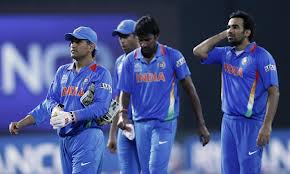
Role of a few seniors comes under scanner after the painful stumble in Colombo. Never in the last three years have India made an exit from World T20 with such a heavy heart.
Disappointing as the last two editions were having failed to win even a single tie in six Super Eight outings in England and the West Indies, their latest elimination was a touch cruel on them. It must have been hard for India to digest the fact that despite winning two matches -- just as the two semifinalists from Group 2, Australia and Pakistan – they had to abort their campaign.
Without completely acquitting MS Dhoni and company of their failure to progress beyond the Super Eights for the third consecutive time, it must be mentioned that they were at the receiving end those ‘uncontrollable’ elements in the game. They may have been castigated for their heavy defeat against Australia, the primary reason behind their early departure, but the fact remains that India’s bowlers, particularly the spinners, were severely handicapped after a brief shower just at the start of the Australian chase left the ball wet and nicely settled the pitch in favour of batsmen.
The hiding Australia gave was so forceful that India were always playing the catch-up game in the rest of their matches. As if that defeat wasn’t bad enough, Australia unexpectedly crashed to their first defeat of the tournament and how! Their 32-run loss to Pakistan on Tuesday left India with prayers on their lips, going into their final match against South Africa that didn’t pan out as they expected.
“I think the same question was asked in Australia. It is one question that always arises if you haven’t done well,” said Dhoni when asked if the team needed an overhaul. “You just see the performances in this tournament so far, where we lost? We lost just one game badly and all of you have been covering cricket for a long time and we all know what impact rain has on bowlers, especially spinners. Our (fast) bowlers don’t bowl at 140 plus. So let us get practical about what the reason was and see was it the real fault of the players? It is not...it can happen in this format.?You don’t want to be in a situation where other games involving other teams can affect you. But sometimes you are forced to accept what is pushed on you,” explained Dhoni gathering his wits.
While Dhoni’s argument isn’t without any merit, some impassive post-mortem ought to be done to find out India’s continued failures in the shortest format. Let’s look at the advantages they enjoyed in the tournament. Apart from Australia, they were the only side to have played all their matches at the R Premadasa but India were the only team whose every encounter was in the night and not in the oppressively humid afternoons.
Not even the home team was extended this luxury for obvious reasons. So, one would expect India to have acclimatised to the conditions better than anyone else. That they couldn’t get their act together proved that, at the end of the day, cricket is a battle between bat and ball as much as it’s about battling conditions.
While the bowlers’ inability to keep Aussie batsmen in check may eventually have cost India a semifinal berth, it was, in fact, the Indian attack, never their strong forte, that kept them afloat in the tournament. In five matches, they bowled out their opposition on four occasions, an incredible feat in the T20 format. It was the batsmen who were the bigger culprits. Their openers remained iffy throughout the tournament while it was obvious that there was too much reliance on Virat Kohli. Whenever the 23-year-old failed, the middle-order was left with too much to do. Barring the game against England, when they rattled 170/4, Indian batsmen could never impose themselves on the opposition.
India’s next T20 isn’t until December when Pakistan are scheduled to tour for three one-dayers and two T20s, and it’s time for some harsh calls. Especially so regarding the role of some seniors in the side.






Comments
Add new comment